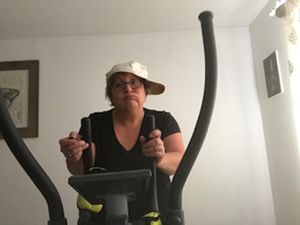In March 2010, I had a hysterectomy following a suspected ovarian cancer diagnosis.
Thankfully, it was a benign cyst. Huge relief, but an agonising six-week wait.
The consultant explained that menopause had been triggered due to the hormone imbalance caused by the hysterectomy. He recommended a course of HRT that would 'trick' my body into thinking that nothing had changed and reduce the symptoms of menopause. The consultant didn't provide me with any guidance on what to expect and because all I knew about menopause were 'hot flushes', I didn't think to ask about any other symptoms.

Do they think that women just 'know' what happens? I have found it fascinating to learn that most women are completely unaware of the myriad of symptoms associated with menopause.
I haven't slept properly since my surgery and I LOVE my sleep! Fatigue is a big problem as a result of insomnia and the frequent changes in body temperature during the night. Weekend naps are my saviour!
I've often got a small fan with me to help reduce the impact of the 'face furnace' and I keep a supply of Tiger Balm and Nurofen Plus to ease the debilitating migraines. At one point I thought I was part-werewolf because my migraines coincide with the full moon, but after many tests, (thankfully no silver bullets!) my GP concluded they are hormonal, therefore cyclical and just happen to be in line with the full moon!
Weight gain has been an issue, possibly due to a lack of energy from the sleep deprivation. Before the surgery, I was very fit and active but since then I can't muster up any enthusiasm in spite of my ever increasing girth!
Beware of brain fog! I had suddenly become my nan, staring at the TV, recognising the actors but not being able to recall their names. I was genuinely concerned that I had Alzheimer's until I started looking into menopause for mental health awareness week a few years ago and was somewhat relieved to find that it is a common symptom. I make LOTS of lists to try to reduce the impact of the memory loss and general brain fog, but it is hugely frustrating.
I am very open about my experience with menopause and talk about my personal struggles to inform others and to 'normalise' it in the workplace. Russell-Cooke has a high number of female staff so it is important that we understand the symptoms and offer support to our colleagues going through it. We recently set up a group, (HRTea) and meet monthly to share ideas and experiences. This has proved to be very beneficial and reassuring for everyone to know we are not alone and that there are things we can do that can reduce the symptoms.
I have no idea when it will end, or whether I will have to live with plus size clothes, an ailing memory and migraines for the rest of my life, but I've learnt to live with it and count my blessings that it could be a lot worse and that I'm not alone.
The content of this article is intended to provide a general guide to the subject matter. Specialist advice should be sought about your specific circumstances.

